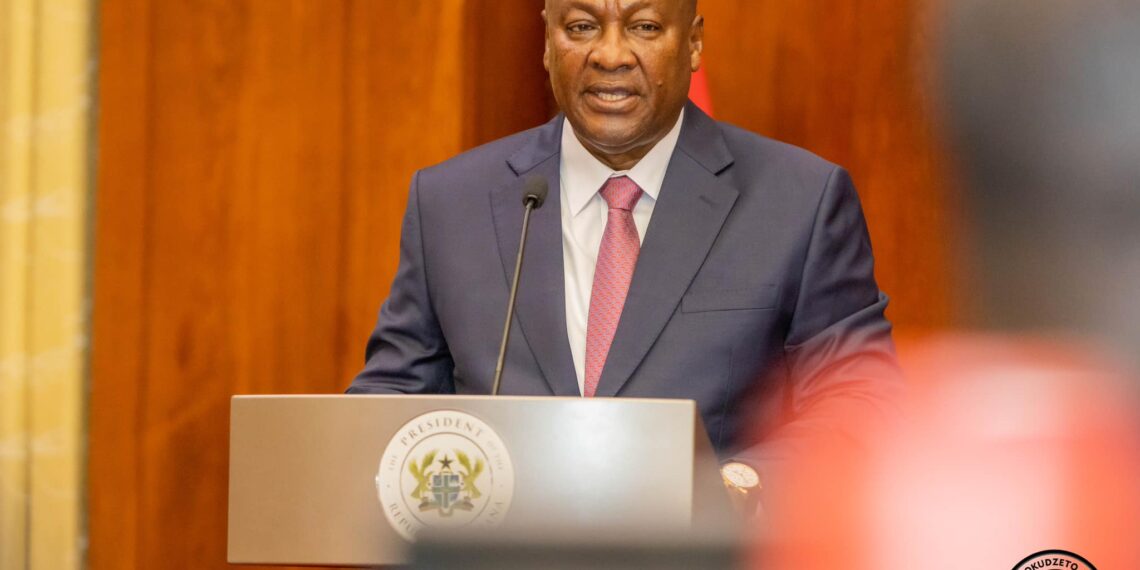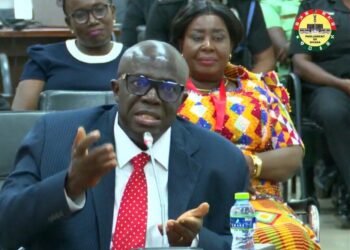His Excellency John Dramani Mahama, President of the Republic of Ghana, has reaffirmed his administration’s commitment to a long-term, inclusive, and sustainable national development strategy in a strong plea for visionary leadership and institutional continuity.
Speaking at the National Development Planning Commission’s (NDPC) eighth inauguration and swearing-in ceremony, President Mahama emphasised how crucial it is to forge a cohesive development agenda that serves the long-term interests of the Ghanaian people, despite political cycles.
The National Development Planning Commission, established under Articles 86 and 87 of the 1992 Constitution and further empowered by Act 479 of 1994, occupies a pivotal role in shaping Ghana’s socio-economic trajectory.
The Commission is tasked with preparing comprehensive national development plans, monitoring and evaluating the performance of government programs, and offering policy guidance to the presidency and parliament through rigorous research and evidence-based analysis.
“This is a significant mandate that demands broad consultation and active engagement with citizens across all sectors of society. Over the years, the commission has upheld this responsibility, and I trust that under your leadership, it will continue to do so with renewed diligence, integrity, and commitment.
HE President John Dramani Mahama
NDPC’s Contributions to National Development
Acknowledging the NDPC’s long-standing contributions to national policy planning, the President expressed confidence in the newly constituted commission under the leadership of Dr. Nii Moi Thompson.
Dr. Thompson, a seasoned development economist and former Director General of the same commission, according to President Mahama, now returns to steer the Commission in a critical moment for national transformation.

President Mahama described the appointment of Dr. Thompson as timely and apt, especially given his leadership role in the formulation of Ghana’s 40-Year Development Plan, which was completed in 2017.
President Mahama noted that as required by Article 36(5) of the Constitution, his administration is currently preparing its Coordinated Programme of Economic and Social Development Policies.
This program, to be submitted to Parliament within two years of his assumption of office, is a constitutional imperative and a blueprint for aligning the priorities of ministries, departments, agencies, and metropolitan, municipal and district assemblies.
“My office stands ready to support this important process as the program will reflect not only the vision and policy priorities of this government but also the collective aspirations of the ministry.
“This framework will guide the operations of ministries, departments, agencies and metropolitan municipal and district assemblies over the next four years.”
HE President John Dramani Mahama
Quest for National Development Plan
Yet beyond the immediate constitutional obligations, President Mahama took a bold stance on a more pressing national question—Ghana’s lack of a unifying long-term development framework.
He acknowledged the growing public consensus on the need for a stable, predictable, and forward-looking path for national development—one that is not susceptible to the short-termism that often characterises politics in a multi-party democracy.

The President passionately echoed these concerns and invoked the wisdom of Ghana’s founding leader, Osagyefo Dr. Kwame Nkrumah, whose seven-year development plan remains one of the most visionary blueprints in the country’s post-independence history.
“Here I’m reminded of the words of Osagyefo Dr Kwame Nkrumah in his visionary seven-year development plan, and he stated that the economic policies will lack direction and consistency unless they are firmly related to a clear vision of the structure of the economy towards which we are moving. In the long run, he made the argument that it is irrational to project any radical transformation of our economic system.
“And he goes on to say that, in a very short period, we remain prisoners of our past. And so already Dr Kwame Nkrumah was projecting that we should have a longer view of our path of development.”
HE President John Dramani Mahama
Seven Decades of Narrow-Based Primary Commodities
The President bemoaned that, nearly seven decades after independence, Ghana’s economy remains tethered to a narrow base of primary commodities, with minimal value addition and diversification.
This structural reality, he argued, continues to entrench economic vulnerabilities and inhibit transformational progress. The persistence of these limitations, he said, is a clear indication that the nation has not yet fully broken free from the colonial economic template it inherited.
In this regard, President Mahama called on the NDPC to consolidate all existing long-term planning frameworks into a singular, cohesive national development plan.
Among these are the 40-Year Development Plan drafted in 2017, the Ghana Beyond Aid Charter, the Ghana @100 Long-Term Development Framework, and the Vision 2057 Perspective Framework.
He stressed that these documents, while valuable in their own right, have often operated in silos or remained underutilized due to shifts in political leadership or lack of legislative backing.

The proposed unified plan, President Mahama emphasised, must be developed through broad consultations with Parliament and stakeholders at all levels to ensure national ownership and legitimacy.
President Mahama reaffirmed that although the task before the Commission is vast, the members’ extensive experience and demonstrated dedication to national service make them uniquely qualified to lead this charge.
“Let us work together to deliver a development plan that charts a bold and transformative path for our dear nation, Ghana. One that will guide future generations and liberate us from the limitations of our past.”
HE President John Dramani Mahama
He concluded with a resounding congratulations, wishing the commission a fruitful work that will guide Ghana into a future of “immeasurable possibilities”.
With the President’s renewed emphasis on strategic national planning and institutional memory, the swearing-in of the eighth NDPC Board marks a defining moment in Ghana’s quest to institutionalise national development planning as a tool for stability and long-term prosperity.
READ ALSO: U.S. Resumes LNG Export Permits to Boost Energy Security



















